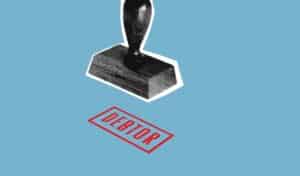Home ∙ Credit Score Ranges ∙ 490 credit score
A FICO score of 490 is considered “poor,” falling within the range of 300 to 579. Improving payment history can raise your score. Set up autopay for bills and loans to avoid missed payments.
If you have a 490 credit score, you may feel disheartened. But on the bright side, you have an established credit score!
Unfortunately, many Americans do not have a credit score at all. According to the Consumer Financial Protection Bureau, 26 million consumers in the U.S. are credit invisible.¹ It’s much easier to improve a bad credit score than to build a credit history from nothing. If you’re curious to know about your loan options or need tips on how to improve your creditworthiness, keep reading!
Key Takeaways for a 490 Credit Score
Overview of Your
Credit Rating
490 is a poor credit score that indicates you have trouble managing your personal finances.
Borrowing Options With a
409 Credit Score
You may have to apply with multiple lenders to get approved for an unsecured loan.
Improving a 490
Credit/FICO Score
You can improve a 490 score by avoiding late payments, reducing your debt, and using secured credit cards.
Is a 409 Credit Score Good?
A 490 credit score is not good. FICO and VantageScore are credit scoring models most often used by lenders to determine creditworthiness. Good FICO Scores start at 670 points, while good VantageScores start at 661. According to Experian, the average credit score in the U.S. was 715 in 2023. Financial experts generally advise subprime borrowers to aim for good credit in order to get better financial and housing opportunities. It may seem daunting to go from a poor score to a good one, but it can be done with patience and continuous effort.
What Can You Get Approved for?
Self
4.6 Ninja Star Rating
- Build credit and savings
- No hard credit pull
- Automatic payments
- Reports to 3 main credit bureaus
Self is a lender that offers an easy and responsible way for borrowers to establish payment history and build credit, while building savings, through a credit builder account. It’s a small installment loan, but the money is yours (minus interest and fees), and even securitized by a CD.
Start Building Your Credit Today!
*Credit Builder Accounts & Certificates of Deposit made/held by Lead Bank, Sunrise Banks, N.A., First Century Bank, N.A., each Member FDIC. Subject to credit approval.
Katapult Lending
4.4 Trustpilot Rating
- lease purchase plans
- Simple process
- No hidden fees
- No credit required
Katapult offers lease purchase plans and paths to ownership for consumers who typically don’t have many financing options. If you’re considering a large purchase but you don’t have great credit, then Katapult may be able to help. They offer solutions with no credit required, and no late fees.
No Minimum Credit Score Required
Yendo
4.4 Google Rating
- Vehicle-secured credit card
- Up to $10,000 in revolving credit
- Quick & easy pre approval
- Build credit with responsible usage
Yendo is the first vehicle secured credit card. This means you can still get approved for their credit card, even with a less-than-perfect credit score. They use the value of your car to help determine your credit limit. They offer credit limits up to $10,000 with no hard credit inquiry.
Must Meet Their Approval Criteria
Take a look at what terms you can generally expect from common loan options below:
Personal Loans
A personal loan is an installment loan that you can use for almost any financial emergency. Many people use personal loans for home or car repairs, medical procedures, childcare costs, and much more. The minimum credit score requirement for a personal loan varies by lender. However, there are many online personal loan lenders that offer bad credit loans. These quick cash loans are meant for subprime borrowers who have trouble qualifying for traditional loans.
Personal loans can provide up to several thousand dollars. If you have a 490 score, you may not qualify for a substantial loan, and your APR may be high. Compare multiple lenders to find the best offer before signing a personal loan agreement.
Bank Loans
Banks offer a wide variety of loan products to help borrowers finance all types of expenses. Bank loans can be secured or unsecured, but you may only qualify for secured options if you have a very poor credit score. Most banks and credit unions offer mortgages, home equity loans, business loans, and lines of credit.
The qualification requirements can be very strict with banks, as they generally require good FICO credit scores in addition to recurring income. While it’s not impossible to get bank loans with bad scores, you may only get high rates and inconvenient terms.
Credit Cards
You may be familiar with traditional credit cards, but did you know about secured credit cards?
A secured credit card is a special type of card that can help borrowers boost their credit scores over time. A credit card applicant will need to provide the issuer with a security deposit, which is typically equal to the credit limit. The lender uses the security deposit as collateral. Once you decide you no longer want or need a secured credit card account, you can close it and get your initial deposit back!
These are some of the best secured credit cards available:
- Capital One Platinum Secured Credit Card
- Discover it® Secured Credit Card
- Chime Credit Builder Secured Visa® Credit Card
- Capital One Quicksilver Secured Cash Rewards Credit Card
- Self Secured Visa® Credit Card
- OpenSky® Plus Secured Visa® Credit Card
Auto Loans
An auto loan is a secured loan that helps borrowers purchase new or used vehicles. The amount a borrower can get through an auto loan depends on their income and credit history. Low-credit borrowers could qualify for auto loans, but the loan terms may be unattractive. Rates on auto loans are generally very high, but borrowers can offer high down payments or choose shorter repayment plans to save on interest fees.
Products To Help Improve a 490 Credit Score
These products can help borrowers improve low credit scores over time:
Balance Transfer Loans
A balance transfer loan, also known as a debt consolidation loan, is an installment loan that can help borrowers pay off high-interest debt. Transferring your debt to a new installment loan account could help you save money if you obtain a lower APR and a longer repayment period. However, balance transfer loans typically charge balance transfer fees. This type of fee can be a flat rate or a percentage of your total transferred balance. It’s critical to calculate how much a transfer would cost before applying because consolidating may not be worth the cost.
Budgeting Apps
A budgeting app is a useful tool that can help you better manage your finances and keep track of your various monthly bills. Using a budgeting app and taking advantage of its features could help you improve a bad credit history over time. Most budgeting apps offer expense tracking, goal setting, bill payment reminders, and checking account linking. There are various budgeting apps available, but luckily, most of them offer free trials.
These are some popular budgeting apps on the market:
- YNAB (You Need A Budget)
- Goodbudget
- EveryDollar
- PocketGuard
- Honeydue
Authorized User
An authorized user is someone who is added to an existing credit account. Authorized users can make purchases (but don’t have to) using their own authorized credit card, but they are not financially responsible for the account. The primary borrower manages the credit account, and their credit history is reflected on the authorized user’s credit report. Responsible management of the credit account can help you, the authorized user, improve your credit score over time.
Here’s a table explaining the potential benefits of becoming an authorized user:
Benefit | How It Works | Impact on Credit Score |
Increased Credit Age | Being added to a well-established credit card can increase the average age of your credit accounts. | This can improve your credit score as older credit histories are seen as less risky. |
Improved Utilization Ratio | The primary account holder’s credit limit contributes to your total available credit. | Lower utilization ratios are better for your score, so having more available credit can decrease your utilization percentage. |
Positive Payment History | If the primary account holder makes payments on time, this positive history also reflects on your report. | Timely payments contribute to a good payment history, boosting your score. |
Diversified Credit Mix | Adding a new type of credit account can diversify your credit mix if you don’t already have a credit card. | Credit scores favor a mix of credit types, though this factor has a smaller impact. |
Regular Account Activity | Regular use and repayment of the credit card show activity and responsible credit use. | Active and responsible use can positively influence your score. |
Benefits of Improving Your 490 Credit Score
These are a few benefits you can take advantage of with an average credit score or higher:
More Housing Options
Improving your credit history can help you look better to potential landlords. When a landlord receives a rental application, they will conduct a credit check to ensure you can pay rent on time. If your credit history shows late payments or a high debt-to-income ratio, you may lose out on your dream apartment! However, a high credit score with a pristine credit history may help you get approved quickly.
Better Interest Rates
Working on getting higher credit scores can help borrowers get approved for lower interest rates. A low rate can reduce the overall cost of borrowing and result in lower monthly payments. High rates are used to lower the lending risk to lenders, who are wary of borrowers who can potentially default on a loan. However, if you are proven to be a reliable borrower, you could get a loan or credit card offer with low APRs.
Higher Credit Limits
Credit limits on credit card accounts depend on credit scores. If you have a low credit score, you are not likely to qualify for a higher credit limit. But if you improve your credit history, you could get higher credit limits. Not only could you spend and withdraw more money from your credit accounts, but your credit utilization rate may decrease! A lower credit utilization rate can further boost your credit and help you get better financial benefits.
How To Improve Your 490 Credit Score
Here are a few steps you can take to start improving your very poor credit score:
Make Timely Payments
Late payments are costly and can significantly decrease your credit, especially if you make multiple late payments. According to a survey by Consumer Reports, one in five adults had paid a credit card late fee in 2023.³ A long history of timely payments can boost your credit score and reflect positively on a credit report. Signing up for autopay or monthly payment alerts can help you avoid forgetting to make a debt payment that ends up on your credit history for up to seven years.
Reduce Your Debt
The amount of credit card debt you have directly affects your credit scores. Credit usage makes up 30% of a FICO Score, which means that too much debt on your credit card accounts can lower your score. If you want to improve your current credit score, it’s critical to prioritize paying down your total credit card debt.
You can work on reducing your personal debt by:
- Paying more than the minimum every month
- Using the debt avalanche method
- Avoiding new credit card purchases
- Consolidating your outstanding debt
Your credit utilization rate should ideally be lower than 30%. You can conveniently calculate your current utilization rate by using online calculators. However, you will have to know your total credit limits and your overall debt balance.
Limit Your Credit Inquiries
Every time you apply for financing, your credit score can decrease by as much as ten points. Too many inquiries can significantly lower your credit scores and make you look bad on credit reports. A credit inquiry can remain on a credit report for up to two years, so keep that in mind when you want to open a new credit account or apply for a loan. Only apply for funding if you absolutely need it. For example, inquiring about a personal loan when you need your car repaired immediately.
FAQs About 409 Credit Scores
What types of secured loans are more accessible with a 490 credit score?
With a credit score of 490, securing a loan can be challenging, but you may have better luck with secured loans where collateral is required. Options like auto loans, secured personal loans, and home equity loans are often more accessible because the lender has the security of your asset to fall back on if payments are missed.
How does being an authorized user affect my credit report?
Being added as an authorized user on another person’s credit card can positively impact your credit report, especially if the account is well-managed. This strategy can help improve your credit mix and utilization ratio, contributing positively to your overall credit scores.
Can a personal loan help consolidate my debts, and how does this affect my credit score?
A personal loan can consolidate high-interest debts into a single, lower-interest loan, which may make it easier to manage debt payments. Consistently making on-time payments on this new loan can positively affect your credit report, as it shows responsible debt management and can gradually improve your credit score.
What should I know about my credit mix, and how can I improve it?
Your credit mix refers to the different types of credit accounts you manage, such as credit cards, personal loans, and mortgages. Improving your credit mix involves diversifying the types of credit you use. Responsibly managing a mix of both revolving (like credit cards) and installment loans (like personal loans) can enhance your credit scores over time.
What are the risks of applying for multiple credit products when I have a 490 credit score?
Applying for several credit products within a short time frame can lead to multiple hard inquiries on your credit report, which might temporarily lower your credit score further. It’s important to space out applications and only apply for credit when necessary to minimize the negative impact on your credit scores.
What Interest Rate Can I Get With a 490 Credit Score?
A 490 credit score means that a borrower has subprime credit and may have difficulty repaying their debts. As a result, you are likely to only get high-interest rates on financial products. If you need emergency cash, it’s critical to research multiple lenders to get the best deal and APR offer. Improving your credit over time will help you get better interest rates and more financial options.
Can I Buy a House With a 490 Credit Score?
Buying a house with a 490 credit score is challenging but not necessarily impossible. Mortgage options such as FHA loans are available for low-credit borrowers. An FHA loan is a loan insured by the Federal Housing Administration. Since the government backs FHA loans, lenders are willing to offer flexible qualification requirements. For example, the minimum credit score requirements are lower with FHA loans than with conventional loans. However, you must still meet other qualifying criteria.
Top 5 Resources for a 490 Credit Score
References:
- What Does It Mean To Be Credit Invisible?│College Data
- What Is the Average Credit Score in the US?│Experian
- The U.S. sharply limits how much credit cards can charge you in late fees│NPR




